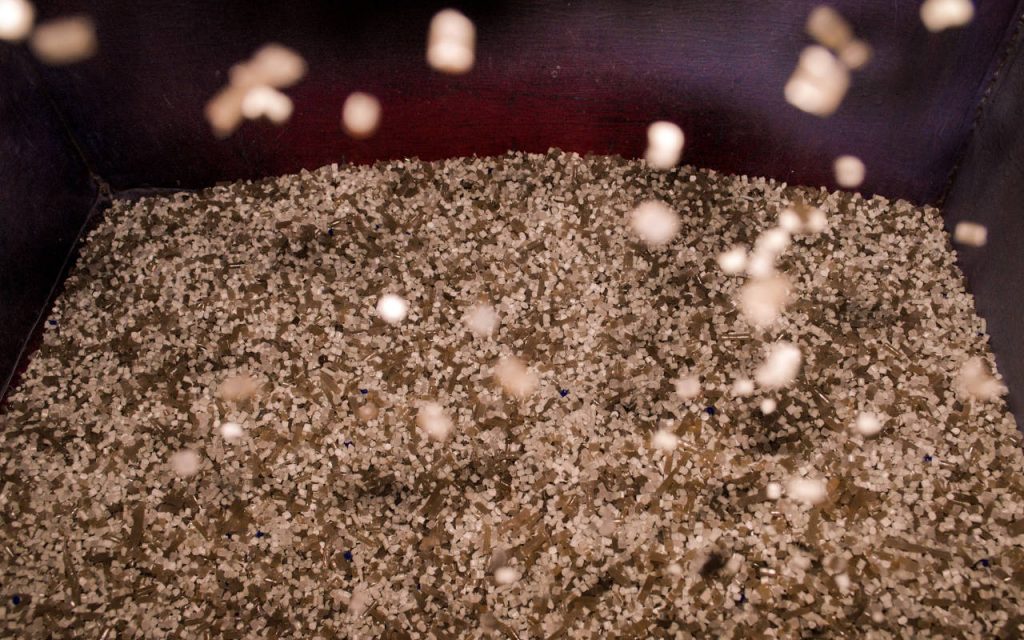Polythene – the wonder material that packages everything from your favourite food to the materials that built your home – is in every part of our lives. And it saves lives, too, with uses in medical devices and packaging, as well as veterinary medicine. It protects electronics, car parts and might even be preventing moisture from rising into your home.
And, on top of all its Earthly uses, polythene packaging makes space exploration possible.
It can do so much with so little. The industrial uses of polythene, as well as the consumer uses, have revolutionised the way we live and work.
But how is polythene made? To find the answers, we’ll have to go back in time…

Polythene origins; where it all began
Little did he know at the time, Hans von Pechmann had accidentally discovered a miracle material.
The year was 1898, and a mysterious, waxy compound was synthesised in von Pechmann’s lab while he was investigating another chemical compound – diazomethane. His colleagues studied the waxy residue and gave it a name; polymethylene.
And nothing came of von Pechmann’s discovery for decades.
That is, until 1933 – when two industrial chemists (Eric Fawcett and Reginald Gibson) accidentally created the very same substance.
They were applying extremely high pressure to a mixture of ethylene and benzaldehyde, which resulted in the same white, waxy material. But they couldn’t seem to make it again, no matter what they tried – because, unbeknownst to them, the accidental production of the material was caused by an oxygen contamination, which facilitated the synthesis of the waxy substance they’d produced.
It took two further years for their colleague, Michael Perrin, to develop a chemical process for creating what we now call virgin polythene.
How is virgin polythene made?
Virgin polythene (LDPE) is produced chemically, from a hydrocarbon gas called ethylene.
The chemical synthesis process takes monomers – single molecules of ethylene – and links them into a long chain, called a polymer. This is done by adding catalysts (like the accidental oxygen contamination that Fawcett and Gibson had) at high temperatures and pressure.
The catalyst promotes a chemical reaction where, instead of having free-floating molecules of gas, electrons in the double bond of one molecule can now link two molecules together; repeating as long chains.
This produces the raw, pure polymer; transparent, highly branched chains of polythene, ready to be melted down into pellets of virgin polythene. Polythene additives can be blended with the polymer to enhance its properties and resistance to environmental conditions when making polythene films.
Read more: How is polythene film made?
HDPE – the plastic used in milk bottles – is produced in a different way. Aluminium titanium catalysts are used, called a Ziegler-Natta (named after Karl Ziegler and Giulio Natta who refined the process of HDPE synthesis). This results in minimal branching, creating a denser plastic with higher opacity.
How is recycled polythene made?
Making recycled polythene packaging is just as complex as virgin polythene – because it has to go through several processes before it can be used as a packaging material again.
The biggest and most vital step is sorting; the most pervasive problem when recycling post-consumer plastics today. Like-for-like materials have to be grouped together, by colour if possible, and the presence of additives may not be obvious. It’s currently difficult, even with sorting machines.
Find out more – how is plastic packaging recycled?
This is why pre-consumer polythene is much more viable for effective recycling; pre-consumer recycled polythene is all the scraps and trimmings from manufacturing, plus any direct industrial or commercial logistics waste. It’s all sorted and pure, making the end product more reliable and consistent.
Polythene packaging that does exactly what you need it to
Talk to our friendly polythene experts at NPF Packaging – and start your order for fully recyclable polythene packaging. We’ll deliver your polythene products to your exact specifications; as sheeting, bags or layflat tubing. Choose recycled polythene packaging or virgin material, in custom polymer blends that meet your exact needs. Get a quote now, or call us on 01773 820415.


